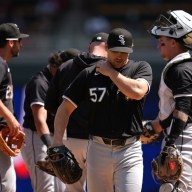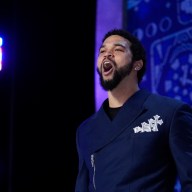Paul Williams has led quite a life as a prolific songwriter — behind hits like “We’ve Only Just Begun” and “The Rainbow Connection” — and an actor and a charming talk-show regular. But that doesn’t necessarily mean he was excited about filmmaker Stephen Kessler featuring him in the new documentary, “Paul Williams Still Alive.” But Williams is nothing if not a good sport. He spoke with Metro about watching his life chronicled onscreen.
You seem pretty uncomfortable for much of the film with Stephen following you around.
Somewhere [during a tour of] the Philippines [chronicled in the film], I decided I really liked him. I think he came into the film maybe without a conscious kind of conception of what he wanted. I think he would’ve been thrilled to find me living in a trailer behind a junkyard, playing at the Red Lion nightly, doing “The Rainbow Connection” with a sock puppet, but the fact is he walked into a life that I was really happy with. I’m 22 years sober and happily married, I have a good relationship with my kids. I’d kind of rebuilt my career. There are some things that are not in the film that he kind of carefully ignores because it interferes with his storytelling.
Were you worried about anything the film depicts about your life?
I was really worried about showing it to my kids, especially my daughter. I had editing rights, so I could take anything out that I wanted, but there’s the part where I’m filmed watching the “Merv Griffin” footage, and I’m just joking about marital infidelity and getting laid on the road, and I thought, “You can’t leave that in.” But when I saw the first cut of the film, I thought, “You know what? If you’re going to tell the story, you’ve got to leave it in.”
We’ve had the recent passings of Amy Winehouse and Whitney Houston. Do
you see the music business as a sort of enabler for substance abuse?
Those
are just the ones that get written about. I think that basically there
isn’t any real difference between a rock star shooting heroin and a
bored housewife in Ohio drinking Listerine. They’re both self-medicating
and probably dealing with their fear and their boredom, their anxiety.
They suffer from addiction or alcoholism, and it’s a disease. Some
studies proved it in the ’60s. I think that in some ways, as long as I
was moving forward and showing up for the gigs and funny and I had the
energy to keep going, there were enablers around me, but I can’t lay any
of that off on anybody. I have to really own all of that myself.
You
were a guest on the “Tonight” show 50 times. If you were to get back
into the talk show circuit, would you prefer talking to Jay Leno or
Conan O’Brien?
Well you know, it’s funny because I just spent the
last two days in Arizona playing golf with Alan Kalter. Alan’s one of my
best friends, and he’s the announcer on the David Letterman show. You
know, I like [Jimmy] Fallon, I did Fallon’s show this last year and I
really like them. I love Conan. I’m learning how to walk like Conan,
that’s the main thing. I find that if I throw my elbows heavily to the
left and to the right, I can face the day with a little sparkle. And I’m
a Letterman addict. My wife and I watch Letterman all the time. You
know, that’s pretty much it. I haven’t been watching the “Tonight” show a
lot.
As the president of ASCAP, how do you think the landscape for songwriters has changed?
There was a time when you went to the Papa Bear, which was the record company, and you had this whole machine working to present you to the music-consuming audience that had three networks to watch and had Top 40 radio. The streams that you fought to get your work into were so minimal, but if you got into that, you got everybody. You did the “Tonight” show, you got everybody. You got played on the Top 40 stations, everybody got to hear those songs. Now everything has become so fractionalized. The challenges are to find ways to be heard. I think as far as the creativity, it’s spectacular. To me, rap was like urban poetry. As an Academy member, I voted for Eminem and “It’s Hard Out There for a Pimp,” a great rap song written for the movies. Every generation has its own music. I love some of those combinations of melodic and … blah blah blah. Who cares what some 71-year-old f–er thinks about today’s music?
















